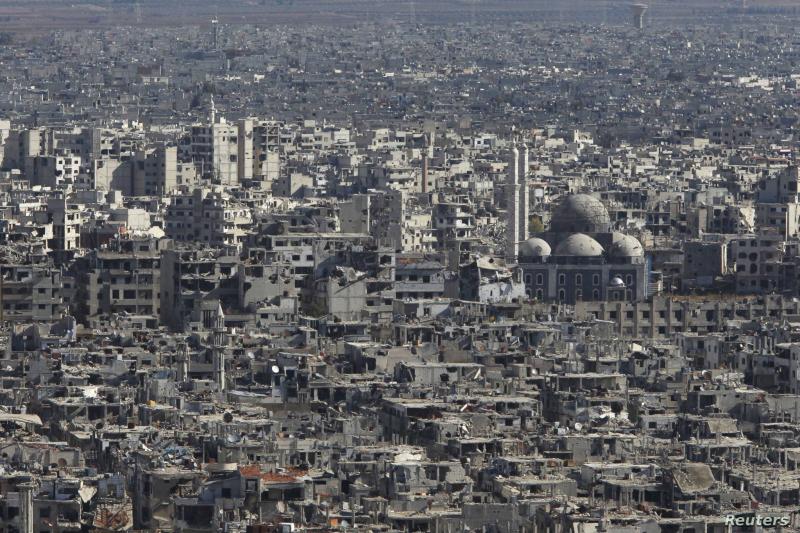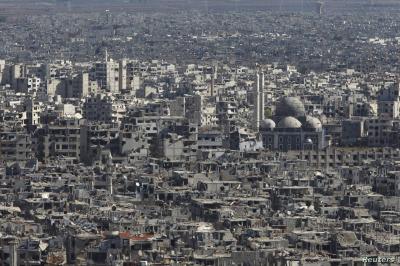Under the title "Iranian Emir's Brokers: How 'Guardians of the Shrine' Buy Syrian Properties," Al-Hurra reported that less than a month ago, a man named "F.B." sold his house located in the al-Hari area on the Syrian-Iraqi border for 105 million Syrian pounds to one of the "brokers" active in areas controlled by the Syrian regime and Iranian militias in Deir ez-Zor province. This decision was reportedly "forced" upon the seller due to the dire economic situation he and his family faced, according to a close acquaintance, who mentioned to Al-Hurra: "There are two brokers who are widely known to be connected to Haj Amir al-Irani."
Activists from Deir ez-Zor and local media reports state that Haj Amir al-Irani is the primary person responsible for the militias supported by Tehran in eastern Syria, especially those spread in the border city of Al-Bukamal, extending to the city of Mayadeen. While the identity and real name of the "Iranian" remain unclear, a spokesman for the "Ain al-Furat" network states that he is also the main facilitator of property transactions in the cities of Al-Bukamal and Mayadeen, which have reached unprecedented levels in recent months.
Amjad al-Sari explained in statements to Al-Hurra that "Amir al-Irani" has a headquarters in the village of Huwayjah Sakar and established another one in Al-Bukamal on July 8 near Omar ibn al-Khattab Mosque, located on the old political street near Martyrs' Park. Al-Bukamal is considered a stronghold for Iranian militias known in Shia doctrine as "Defenders of the Shrine" or "Guardians of the Shrine," referring to the shrine of Sayyida Zainab in Damascus.
The Syrian city of Mayadeen is referred to as the "capital" of the militias, which generally receive direct support from the Iranian Revolutionary Guard and have military bases there, as confirmed by local reports from within Syria as well as other foreign sources.
### "Another Type of Recruitment"
Although discussions about Iranian interests in Syrian properties and their efforts to acquire them are not new, they have escalated to previously unseen levels in recent months, according to Syrian journalists and activists speaking to Al-Hurra. The activity is not limited to one area but is widespread. In addition to Deir ez-Zor province, reports from the Syrian Observatory for Human Rights indicate Iranian attempts to buy properties in eastern rural Damascus and regions of rural Homs, reaching northeastern Syria in Raqqa province.
On July 24, the Syrian Observatory reported that Iranian militias in Syria, "by orders from their leadership," had begun recruiting young men from Al-Mayadeen, Al-Bukamal, and other areas in Deir ez-Zor. The report stated: "They sent them to areas under the control of the Syrian regime in Raqqa province to acquire properties including land, homes, and commercial shops there." The observatory added that the same tactic was applied by the militias in Eastern and Western Ghouta, recruiting local individuals from Deir ez-Zor and sending them there, where they acquired dozens of properties.
Iran remains silent regarding the accusations against it concerning this matter, an approach that has been followed by the Syrian regime for years, as there has been no official response either denying or confirming these claims. Political analyst residing in Damascus, Ya'rab Khairbek, states that reports of Iran purchasing properties in rural Damascus are "not accurate." In statements to Al-Hurra, he mentioned discussions with lawyers and real estate owners confirming that "there are no such movements, either previously or currently." He continued, "Real estate office owners I spoke to challenge anyone to present a legal document proving it… it's impossible."
### "Significant Surge"
For years, many media reports and statements from Syrian activists have sought to highlight the phenomenon that "Tehran is buying Syrian properties." These sources argue that this is part of a "demographic change policy" that Tehran is accused of implementing in various Syrian regions, especially where its militias are heavily present around Damascus and along the Syrian-Iraqi border.
There are no statistics on the scale of the buying operations that Iran is alleged to be involved in within Syria, which constitutes an obstacle to any legal or rights-based actions to halt these practices. In general terms, which few deviate from, Omar Abu Leyla, director of the "Deir ez-Zor 24" network, refers to a "significant surge" in property purchases by individuals he calls "Iranian agents" in the area. Abu Leyla stated in remarks to Al-Hurra: "There are agents relied upon by Iran for purchasing operations, and this is increasing daily, especially in Deir ez-Zor, due to the irresistible incentives provided to those agents."
Abu Leyla clarified that there are several reasons behind the "agents'" operations with Iran, including financial and security motivations, to obtain protection against any transgressions they may commit. The Syrian journalist continued: "There is a significant surge in sales to Iranian agents of lands, vehicles, residential apartments, and other properties. The agents have direct connections to Iranian officials, both military and religious."
Activists from Deir ez-Zor circulate several names on social media of agents they claim are associated with Iranian militias and the "Revolutionary Guard." Most of them are from Deir ez-Zor province and possess "absolute authority" to carry out assigned tasks not only within Syrian regime-controlled areas but sometimes in other Syrian regions, such as those under the control of the Syrian Democratic Forces, according to Syrian journalist Omar Abu Leyla.
### "In Full Swing"
Contrarily, since the beginning of this year, an unprecedented boom and activity have been observed across various Syrian provinces in the real estate market, including agricultural lands and residential homes. This is attributed to a large segment of the population descending into "poverty," pushing them to sell their properties, breaking the norm that "land is like honor," as stated by Muhammad Awad (a pseudonym) from the city of Homs in central Syria. Awad told Al-Hurra: "Nothing is moving in the country except for buying and selling properties and lands. People have begun selling their lands and homes to eat and continue their lives."
Awad did not rule out reports of "Iranian agents" buying properties in various Syrian provinces, pointing out that there is a brisk sale "in full swing" in rural Homs, especially in Qusair and the villages and towns belonging to it. He specified: "Sales there are exclusively to merchants from the Shia community. It is said that they are close to Hezbollah and Iran, but there is no evidence for that. There are other sales within the city to merchants from the Abbasiyah area, which is also inhabited by the Shia community."
Awad, currently residing in Homs, confirmed that the city "remains in ruins," and there is a prevailing thought among residents that selling homes is preferable to repairing them, which would cost millions of lira, possibly "billions," as he expressed.
### "Facilitations in Place"
As the tenth year of the war in Syria passes, most cities remain in a state of destruction, and the Assad government has yet to take any steps to allow original residents to return to their homes or permit them to renovate them. Journalist Omar Abu Leyla believes that the state of destruction and the poor economic situation make selling to "Iranian agents" quite easy. He stated: "In Deir ez-Zor, I confirm that sales are ongoing and increasing significantly without respite." He added, "There is one party controlling everything, injecting money, while the other party is the agent who is expanding the issue for the incentives they receive."
Meanwhile, Amjad al-Sari, the spokesman for the "Ain al-Furat" network, spoke about practices of seizing homes and properties by Iranian militias in eastern Syria, away from any official sale process. He noted in remarks to Al-Hurra: "Several homes have been abandoned by their owners due to being adjacent to militia headquarters, such as the al-Arba'in neighborhood in Mayadeen, associations in Al-Bukamal, and the al-Rusafa neighborhood in Deir ez-Zor." The Syrian journalist mentioned: "In recent months, purchases have been limited to homes located on the main street in Al-Bukamal and in areas like al-Suwayiah and al-Hari, due to their proximity to the Iraqi border."
### "The Law Facilitates"
Previously, strict Syrian laws did not allow Arabs or foreigners to own property in Syria. However, in 2008, a law numbered 11 was issued, opening the door for non-Syrians to own housing. This was followed by law no. 11 in 2011, which allowed foreigners to own all types of properties in Syria. During that period, the issuance of these decisions raised many questions within Syrian circles regarding their purpose, especially considering the timing of the last one coinciding with the onset of the Syrian revolution.
According to the official narrative, the last law issued in 2011 "grants an additional advantage to Arab and foreign capital, reassures them regarding their investments in Syria, and provides more advantages and facilitations for investors." However, opponents view it differently, and several legal bodies have warned in past years that these two laws have opened wide avenues "for Iranians" to buy properties of various types, thereby causing demographic changes, particularly with millions of Syrians displaced outside their homeland.




